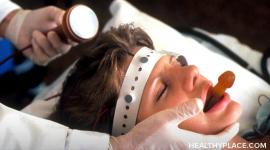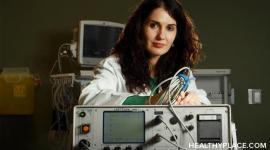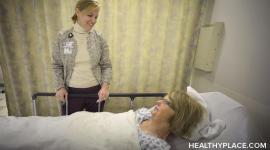Effects of ECT, ECT Side Effects

The effects of ECT (electroconvulsive therapy) are not fully understood, nor is the way in which ECT is able to treat mental illness. It is known the effects of ECT are seen in multiple parts of the central nervous system such as the:
- Hormones
- Neuropeptides
- Neurotrophic factors
- Neurotransmitters
The effects in ECT have been seen in nearly every neurotransmitter system in the brain and this is also what antidepressants target, leading to the belief that part of the therapeutic effect of ECT is through changes to neurotransmitters.
ECT also has been shown to increase a protein known as a brain-derived neurotrophic factor (BDNF),1 an effect also seen in antidepressants. This protein increase is thought to cause the formation of both synapses and neurons in the brain. This effect of ECT is more robust than in antidepressant treatment and is thought to be responsible for the increase in volume in parts of the brain.2
ECT Side Effects
The primary ECT side effects are cognitive in nature, including possible memory loss. ECT side effects include:3
- Brief disorientation and confusion immediately after treatment
- Headache
- Nausea
- Muscle pain and stiffness
- Memory loss, particularly of the recent events before the ECT treatment
- Possible impact on information processing speed, particularly in the elderly
There is great debate over severity and duration of cognitive side effects, with some claiming permanent cognitive changes. (read ECT stories and Electroshock Therapy: Harmed By Electric Shock Treatment)
Some ECT memory loss diminishes with time while some may be permanent. It is thought impersonal memory (memory of outside events) is more subject to ECT memory loss than autobiographical memory (memory about the self).4 ECT memory loss and other cognitive ECT side effects are often related to the type of ECT treatment and the number of treatments received.
ECT side effects are generally considered reasonable risks given the severity of the illness being treated by ECT.
Electroconvulsive therapy, once known as shock therapy, uses electricity to stimulate parts of the brain in the treatment of mental, and other, illness. While some find this to be controversial, approximately 100,000 patients receive electroconvulsive therapy (ECT) in the United States every year. In a meta-analysis of study data, ECT outperformed placebo, sham treatment, and antidepressants in the treatment of depression.5
APA Reference
Tracy, N.
(2022, January 4). Effects of ECT, ECT Side Effects, HealthyPlace. Retrieved
on 2024, June 20 from https://www.healthyplace.com/depression/ect/effects-of-ect-ect-side-effects


